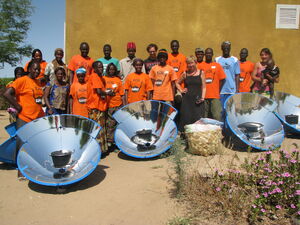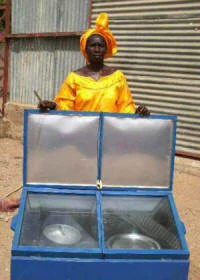- November 2012: GloboSol annual report: Senegal - Solar ovens at the school of Malicounda - This year Ursina von Albertini, the manager for the GloboSol project, abstained from her yearly visit in February and March. The reason for this was the election of the President, which had engendered fears of violent unrest. In addition, a visit did not seem urgent. Growing from a solid base, the project in the village of Malicounda, Senegal, has developed and grown on its own initiative. Healthy food cooked in five solar ovens is distributed once a week to children and elderly residents. Also, a village shop for solar products like marmalade, syrup, bakers ware, soap and cleanser will be opening soon. In the neighbouring village of Mbour a second interested group of about 20 women was founded using a similar educational program. These women, as well, are learning with diligence and enthusiasm.
- January 2011: GloboSol reports on solar ovens at a school of Malicounda: The project has developed in a way that deserves admiration: From a group of mothers of school children who started to work with solar ovens a few years ago, there arose an association with the goal of teaching women in themes like use of alternative energies against deforestation, advertising strategies to learn selling solar production of marmalade, syrup, soap and scouring agent as new resources of income; to learn book-keeping skills and relations with the banks etc. At the same time meals for the schoolchildren are regularly cooked. The 25 active women, assisted by U.v.Albertini, elaborated clear instructions which they follow with fierce determination. Since even the president of the community had become aware of the group, the women receive regular financial support for their further development courses.

SolarCooker Eco3 solar cookers are distributed in Senegal
- December 2011: Solar Cooking NV and Sol Suffit ship 630 solar cookers to Senegal - The project is a joint venture between Solar Cooking NV in the Netherlands, and Sol Suffit, a long time promoter of solar cooking in Senegal. The SolarCooker Eco3 cookers will be introduced in Dakar and in eight villages next to Djoudj National Park. Local volunteers participated in workshops, and will be training others in the surrounding villages. Trainees were also made familiar with the method of heat retention cooking. They found it quite easy to make good quality hay baskets with inexpensive baskets(locally made) and empty rice bags filled with dry hay.
- February 2010: Sol Suffit is working to bring its super-clean and super-simple solar cooker to developing nations, to replace the environmentally-devastating traditional cooking methods that rely on firewood and charcoal. The project started in the Djoudj National Bird Park, a World Heritage site in Senegal, and now has also set up shop in Pikine, a suburb of Dakar, across the continent in Tanzania, and is currently working to establish a presence in Cameroon with a partner organization. Project leader Axel Vanderhaeghen said, based on "the response from everyone who gets to know the project, we're very certain it won't stop in Cameroon. Also, we found a way to introduce bigger solar cookers now, thanks to microcredits." They are looking for partner organizations to help with their efforts. Read more at: Solar Cookers Taking Hold in Africa: Want to Help?

Cooking fish sauce for dinner in the village of Nioro du Rip
- November 2009: A Peace Corps Volunteer worked in a small rural village near Nioro du Rip, training one family how to use a simple solar cooker, cooking local dishes in a new way while retaining already-existing pots and cooking materials.
- November 2009: The rural community of Méouane (Tivaouane), Senegal has a new solar bakery that reaches 500°C and supplies bread to a village of about 70 houses. The launching ceremony was organized by the GIE Sope Khadim village women, who simultaneously received 140 ovens for cooking at home. Present at the event, the office manager of solar cookers to the Ministry of Scientific Research, Abdoulaye Toure, explained his presence by the government's willingness to assist women in starting their solar cookers. This project is funded by the GEF Small Grants Programme (GEF), with technical collaboration of the United Nations Program for Development (UNDP). The mobile solar bakery reaches 500°C and can produce 70 loaves in the morning and 100 in the evening," said Abdoulaye Toure. Since 1982, he added, this project has operated. "With American cooperation, the project was updated and we've created a solar bakery," said the designer. He added: "It can be moved around because we have found to Mekhe, Pékess, Thilmakha holding weekly markets in their localities. The oven can serve these people too. More info...
- November 2009: UN Environment Fund donates 140 solar cookers to the women of Ndoukoura, Senegal (French) - Agence de Presse Sénégalaise

Solar cooking trainer Kiné Seck demonstrates how to use the HotPot as part of the Senegal Solar Cooking Initiative
- July 2009: Through the Senegal Solar Cooking Initiative, project partners Solar Household Energy, Inc. (SHE) and Tostan will train and equip 2,000 families with HotPot solar cookers. Dozens of villages are participating in the project, and are sending groups of three representatives to be trained. A point person from each village is selected, and is responsible for conducting local demonstrations, distributing HotPots, answering questions, and offering advice. A regional trainer offers further support as needed. Foods that are solar cooked at the demonstrations include fish, rice, beans, millet porridge, and cakes. By mid-2008, 1,000 HotPots had been distributed in the Thies region and 350 in the Kaolack region. The remaining HotPots are slated for the Touba region.

Large, sturdy solar box cookers manufactured by local craftsman are being distributed in Mékhé
- July 2009: Through a partnership with GEN Senegal, the Association pour la promotion des femmes de Mékhé (ASPROFEM) is implementing a two-year solar cooker project in the Mékhé districts of MBambara, Lébou and Ndiop. The project is funded by the Global Environment Facility (GEF) Small Grants Programme, which is implemented by the United Nations Development Programme (UNDP).The goal of the project is to help preserve trees through the use of solar energy as an alternative to firewood. With the help of several local craftsmen, solar cookers will be manufacturer in each of the three districts under the direction of cooker designer Abdoulaye Toure. Each district will have approximately 10 trainers to raise awareness in the community, teach solar cooking skills, and distribute solar cookers. One hundred solar cookers were distributed in Ndiop during the pilot phase of the project. The second phase of the project began last year and runs through the end of 2009.

Villagers near Djoudj National Park will not have to spend as much time collecting firewood if they regularly use solar cookers
- July 2009: Natuur.koepel vzw has launched a multi-year solar cooker project called Sol Suffit in eight villages surrounding Senegal’s Djoudj National Park. Between December 2007 and May 2008 about 400 women were trained in the use of the solar CooKit. During this time, village chiefs and elders were also given CooKit demonstrations, and several women were selected as representatives for their respective villages. In November, Natuur.koepel vzw demonstrated solar cooking at a music festival near Dakar that garnered a lot of local press for the project. By the end of February 2009, Sol Suffit had obtained workshop space and had enough supplies to produce 1,000 CooKits. The CooKits are being sold to villagers at a subsidized price of € 1.50 each, plus an additional € 1.50 for a black cooking pot if needed.
- November 2008: The Senegalese Ministry of Biofuels and Renewable Energy is entering into an agreement with Solar Household Energy to produce and sell solar cookers locally. "We hope to make solar stoves available in all 11 regions of Senegal," said Abdoulaye Touré, solar energy specialist at the ministry. More information...
- July 2007: In Senegal and Burkina Faso, people are finding many ways that the HotPot can improve their daily lives. Currently 220 men and women in Senegal and Burkina Faso are cooking with the HotPot; they are excited about the variety of meals they've cooked and the fuel they’ve saved doing so. Read more about Solar Household Energy's West Africa programs at http://www.she-inc.org/projects-3.php.
- January 2007: The village coordinators in Senegal have been using their HotPots daily and they are excited about the meals they've cooked and their fuel savings. Their experience has increased interest throughout the village. This pilot program began in November and includes 120 participants in 5 villages north of Dakar. Read more here.

